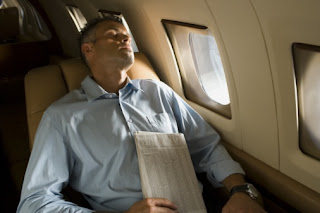
Travelling from coast to coast will make us feel tired and eventually our mind will get shut easily. Zzzzz.... dream after dream; and a 'wet dream'. After we get up, how to purify our body since 'no shower' rule in the WC rooms.
The basic rule is anyone who becomes junub as the result of a wet dream or sexual intercourse has to do ghusl, because Allah says:
“O you who believe! When you intend to offer As-Salaah (the prayer), wash your faces and your hands (forearms) up to the elbows, rub (by passing wet hands over) your heads, and (wash) your feet up to the ankles. If you are in a state of Janaaba (i.e. after a sexual discharge), purify yourselves (bathe your whole body)”
[al-Maa’idah 5:6]
If he cannot do ghusl because there is no water available, or because he is not able to use it, then he should do tayammum and pray, because Allaah says:
“But if you are ill or on a journey, or any of you comes after answering the call of nature, or you have been in contact with women (i.e. sexual intercourse), and you find no water, then perform Tayammum with clean earth and rub therewith your faces and hands. Allaah does not want to place you in difficulty, but He wants to purify you, and to complete His Favour to you that you may be thankful”
[al-Maa’idah 5:6].
Then, whoever is not able to do ghusl because he is sick or it is very cold, or no water such as on board condition; may do tayammum instead and he does not have to repeat his prayers, because of the hadeeth of ‘Amr ibn al-‘Aas who said:
“I had a wet dream on a cold night during the campaign of Dhaat al-Salaasil, and I was scared that if I did ghusl I might die. So I did tayammum and prayed, then in the morning my companions mentioned that to the Prophet (peace and blessings of Allaah be upon him). He said, ‘O ‘Amr, you led your companions in prayer when you were junub.’ I told him what had kept me from doing ghusl and I said, ‘I heard that Allaah says (interpretation of the meaning): “And do not kill yourselves. Surely, Allaah is Most Merciful to you” [al-Nisa’ 4:29].’ The Messenger of Allaah (peace and blessings of Allaah be upon him) smiled and did not say anything.”
(Narrated by Abu Dawood, 334; classed as saheeh by al-Albaani in Saheeh Abi Dawood, 323).

During our vacation, our body dehydrating and obviously we need a replacement for it as water is our basic need to refresh ourselves. Therefore, please bring a bottle of drinking water everywhere you go. Drink a lot of water especially where you are at any hot and humid country. Buy mineral water instead other kind of drinking water that sold in any convenience store. The reason why? Certain countries are lack in water processing and the hygiene standard is low and might caused us terrible experiences
What else that we can do with this mineral water bottle? Take an ablution with it. Traveling from one place to the another place might cause us hard to find the pure water for ablution purpose. So, use your drinking water to take ablution. Use dispenser to maximize the usage of it, spray it out on your body parts.
Practicing Islam is easy and practical...

According to the western culture, you cannot wash your feet inside the basin/sink. It's strictly prohibited especially in any public toilet. So, what the best solution to take ablution that required us to wash our feet?
The solution is, we can wipe our socks intead of washing our feet.
Is this permitted by Islamic law? Absolutely, it's permissible either we are on travelling or not.
Therefore, what are the conditions if someone needs to wipe his socks:
1. The socks should have been put on when you are in a state of tahaarah (purity, i.e., when one has wudoo’). Then, for the next ablution taken, you can wipe the socks.
2. The socks should be taahir (clean/pure). If they are naajis (impure) then it is not permissible to wipe over them.
3. The socks may be wiped over when you're purifying yourself from minor impurity (i.e., doing wudoo’ after passing wind, urine or stools), not when you're in a state of janaabah (major impurity following sexual intercourse) or when ghusl is required.
4. The wiping may be done within the time specified by Islamic law, which is one day and one night in the case of one who is not travelling, and three days and three nights in the case of one who is travelling.

The answer will not satifying yourself. "No such place like that here. We are not allocate any room for that purpose. While you are enjoying your holiday in any non Muslim dominan countries, the basic question is where should I pray today? The five obligation prayers could be merged to 3 times only; i.e. at dawn, afternoon and evening. But, where we can perform that prayers is the crucial one to be answered. If we just stay in the hotel, the answer is not difficult. But, how about if we are moving from one point to the other point?
What is the solution?
a. Find the nearest mosque if possible. You can find it online or using your GPS handphone or etc. It's practical if we plan our journey that include mosque as a visiting point.

b. Going to shopping mall? Use the fitting room. Use newspaper as a prayer mat.
c. Use any hide space area such as staircase etc. By the way, open space is also a best place to pray as well as a da'awah for the non-Muslim.
Pray every where.. Allah creates this world as clean as place of worship. Then, focus on your prayer... Allahu Akbar!




